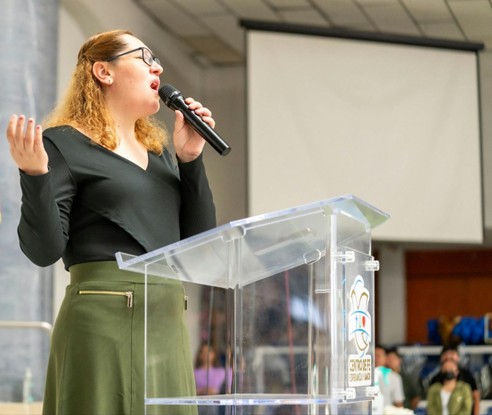Webmaster Note: Guest Post by Lily Tamrick from The Parent Hubspot. The views and opinions expressed in the article are those of the author, and may or may not necessarily reflect those of ad Dei Gloriam Ministries. We have no relationship with any of the organizations linked within the article.
Caution!!! Links in this article are provided by the guest author and may link to Content Marketing / Native Advertising and other sites containing first and third party ad trackers and cookies, along with other privacy threats such as passing on your info to social media sites. We urge our readers to take precautions such as using privacy browsers, ad-blocking apps, VPNs, anti-tracking devices, disabling third-party cookies and other appropriate measures before clicking on any external links.
Image Source: Pexels
 In your calling as a Christian community leader, you're tasked with the sacred responsibility of shepherding souls, resolving conflict, offering guidance, and cultivating unity. But leadership doesn’t end at the pulpit or the meeting table. Today’s most impactful leaders are those who continue to evolve—spiritually, emotionally, and intellectually. Lifelong learning is not just a secular virtue; it's a biblical imperative. Paul urged Timothy to “study to show thyself approved,” a timeless reminder that discipleship and learning are inseparable. And in a fast-changing world where the needs of your community shift almost daily, keeping pace isn’t optional—it’s essential.
In your calling as a Christian community leader, you're tasked with the sacred responsibility of shepherding souls, resolving conflict, offering guidance, and cultivating unity. But leadership doesn’t end at the pulpit or the meeting table. Today’s most impactful leaders are those who continue to evolve—spiritually, emotionally, and intellectually. Lifelong learning is not just a secular virtue; it's a biblical imperative. Paul urged Timothy to “study to show thyself approved,” a timeless reminder that discipleship and learning are inseparable. And in a fast-changing world where the needs of your community shift almost daily, keeping pace isn’t optional—it’s essential.
Biblical Foundations for Continuous Growth
Before diving into the practical benefits, it’s worth acknowledging the scriptural roots of lifelong learning. Proverbs is brimming with exhortations about the value of wisdom, knowledge, and instruction. “Give instruction to a wise man, and he will be still wiser”
(Proverbs 9:9). From Moses learning how to lead from his father-in-law Jethro, to the disciples undergoing transformation under Christ’s daily teaching, the Bible is a rich tapestry of lifelong learners. Your journey as a leader echoes this same path—learning not for vanity, but for service.
Preventing Stagnation in a Dynamic World
Even the most devout leader can become stagnant if they rely solely on past experiences. Ministries that once thrived may falter if leaders aren't adapting to new technologies, emerging needs, and cultural shifts. Lifelong learning
keeps your vision fresh. It encourages curiosity, humility, and relevance—traits that your congregation and community instinctively recognize and respect. When you embrace education, whether formally or informally, you send a clear message: leadership is a posture of growth, not arrival.
Earning a Degree to Advance Your Skills
For many leaders, formal education can be the key that unlocks the next level of impact. Earning a degree is not just about a piece of paper; it's about deepening your toolkit. A business degree, for example, equips community leaders with strategic, financial, and organizational skills to effectively manage resources, drive local initiatives, and create sustainable economic impact. Online degree programs make it easier to juggle learning with your ministry and personal priorities. If this speaks to you, try this:
research flexible university programs that cater to working professionals—you might find the perfect fit to sharpen your calling.. Check them out and you might find the perfect fit to sharpen your calling.
Learning Enhances Empathy and Interpersonal Skills
At the heart of ministry is people. And people are nuanced, complicated, and ever-changing. Whether you're navigating a counseling session or a heated board meeting, deeper understanding—especially of psychology, sociology, and conflict resolution—can be invaluable. Lifelong learning broadens your empathy. You start seeing situations from multiple angles, often disarming tension before it escalates. You become
a better listener. From Moses learning how a better listener, a more thoughtful speaker, and ultimately, a more effective bridge between individuals and God.
Expanding Outreach Through Digital Literacy
In the digital age, your reach is no longer limited to a building or ZIP code. Mastering tools like social media, livestreaming,
email marketing and even podcasting can help extend your ministry’s influence. Lifelong learning in tech doesn't require becoming an expert coder. It just means being open to new platforms that help you communicate timeless truths in timely ways. Imagine the impact of a virtual Bible study attended by believers from across the country—or even the world. Digital literacy is one of the most underutilized but powerful resources at your disposal.
Developing Leadership Capacity in Others
One mark of a great leader is their ability to grow other leaders. But you can't give what you don't have. By modeling a commitment to learning, you encourage your congregation and team members to do the same. You show them that education isn’t something you “finish” at 22—it’s a lifelong discipline. Whether it’s through book clubs, seminars, mentoring programs, or
mentoring programs. From Moses learning how collaborative study, you set a tone that fosters maturity, ownership, and accountability. This ripple effect can fortify your entire ministry.
Navigating Change with Wisdom and Courage
Communities evolve. Economic shifts, social justice movements, political tensions, and generational divides are all realities you have to confront with grace and discernment. Lifelong learning equips you to do that with
more than gut instinct. From Moses learning how more than gut instinct. It gives you frameworks, case studies, data, and context. You won’t just react—you’ll respond. That subtle but profound difference is what sets a wise leader apart from a merely well-intentioned one. And the people you serve will feel the steadiness that education can help instill.
Leadership in the Christian community is a high calling—and it deserves a high level of preparation. The old models of “one and done” seminary degrees or relying on Sunday-only insight no longer suffice in a world where people are looking for relevance, clarity, and authenticity. Lifelong learning is not about chasing credentials; it’s about staying tender to the Holy Spirit, adaptable to the times, and faithful to your mission. Whether through formal degrees, reading widely, attending workshops, or simply staying curious, you answer the call not just to lead—but to grow. And in that growth, you multiply your impact in ways you may not yet imagine.
 Buying a house marks more than a financial milestone—it represents the beginning of a new chapter for your family. Once the papers are signed and the keys are in your hands, the work of shaping a safe, stable, and faith-centered household begins. These early days set the tone for years to come, and the choices you make immediately after closing matter greatly. Think of them as foundations, not just for the structure you purchased, but for the rhythms of family life inside it. By approaching this transition thoughtfully, you can protect your investment, nurture your loved ones, and open space for God’s guidance in your new surroundings.
Buying a house marks more than a financial milestone—it represents the beginning of a new chapter for your family. Once the papers are signed and the keys are in your hands, the work of shaping a safe, stable, and faith-centered household begins. These early days set the tone for years to come, and the choices you make immediately after closing matter greatly. Think of them as foundations, not just for the structure you purchased, but for the rhythms of family life inside it. By approaching this transition thoughtfully, you can protect your investment, nurture your loved ones, and open space for God’s guidance in your new surroundings.
 A mid-life crisis can feel like a private storm, one that shakes your sense of purpose and unsettles your relationships, faith, and vision for the future. For Christians, it can be a strange and sometimes lonely place to stand — caught between what’s been built and what’s still unfinished. The good news is that God’s Word and the lived wisdom of believers offer not just comfort, but a path forward. Inspiration isn’t a magic spark that appears in perfect moments; it’s something we cultivate in the middle of difficulty. Positivity is not a shallow optimism, but a steadying trust that God can work good out of the most uncertain seasons. These years can become a refining fire, not a dead end.
A mid-life crisis can feel like a private storm, one that shakes your sense of purpose and unsettles your relationships, faith, and vision for the future. For Christians, it can be a strange and sometimes lonely place to stand — caught between what’s been built and what’s still unfinished. The good news is that God’s Word and the lived wisdom of believers offer not just comfort, but a path forward. Inspiration isn’t a magic spark that appears in perfect moments; it’s something we cultivate in the middle of difficulty. Positivity is not a shallow optimism, but a steadying trust that God can work good out of the most uncertain seasons. These years can become a refining fire, not a dead end. Gardening isn’t just about flowers and vegetables; it’s a full-body, mind-centering ritual that offers older adults a sense of vitality. Each seed planted carries more than the promise of a harvest—it offers strength, focus, and the quiet satisfaction of creating life from the soil. For those who feel the tug of time in their joints or the weight of isolation, the garden becomes an anchor. It's a place where movement has purpose, food has meaning, and every green shoot feels like proof that something good is still unfolding.
Gardening isn’t just about flowers and vegetables; it’s a full-body, mind-centering ritual that offers older adults a sense of vitality. Each seed planted carries more than the promise of a harvest—it offers strength, focus, and the quiet satisfaction of creating life from the soil. For those who feel the tug of time in their joints or the weight of isolation, the garden becomes an anchor. It's a place where movement has purpose, food has meaning, and every green shoot feels like proof that something good is still unfolding. Summer arrives with a promise of freedom and discovery, but for many parents, that promise quickly morphs into a logistical challenge. How do you keep your child engaged when school’s out, screens beckon, and neighborhood options wear thin by mid-July? If you’re a parent either struggling to find options or just hoping to go beyond the expected, there are plenty of creative, enriching paths to explore. These activities can spark curiosity, build confidence, and introduce your child to new possibilities—all while keeping summer fun and fresh.
Summer arrives with a promise of freedom and discovery, but for many parents, that promise quickly morphs into a logistical challenge. How do you keep your child engaged when school’s out, screens beckon, and neighborhood options wear thin by mid-July? If you’re a parent either struggling to find options or just hoping to go beyond the expected, there are plenty of creative, enriching paths to explore. These activities can spark curiosity, build confidence, and introduce your child to new possibilities—all while keeping summer fun and fresh. In Matthew 29, verses 16-30, we find Jesus telling His disciples the parable of the rich young ruler (see also Mark 10:17-21 and Luke 18:18-30). Most of us are familiar with the parable. A rich young ruler approaches Jesus with the question of how to be saved. Jesus then tells him to keep all of the commandments, and the ruler claims that he has. Jesus then instructs him to sell all his possessions and give the proceeds to the poor so that he might have treasures in heaven. He further instructs him to “come follow Me”. Unfortunately, the ruler rejected Jesus'command and went away sad because he refused to part with his earthly wealth.
In Matthew 29, verses 16-30, we find Jesus telling His disciples the parable of the rich young ruler (see also Mark 10:17-21 and Luke 18:18-30). Most of us are familiar with the parable. A rich young ruler approaches Jesus with the question of how to be saved. Jesus then tells him to keep all of the commandments, and the ruler claims that he has. Jesus then instructs him to sell all his possessions and give the proceeds to the poor so that he might have treasures in heaven. He further instructs him to “come follow Me”. Unfortunately, the ruler rejected Jesus'command and went away sad because he refused to part with his earthly wealth. In your calling as a Christian community leader, you're tasked with the sacred responsibility of shepherding souls, resolving conflict, offering guidance, and cultivating unity. But leadership doesn’t end at the pulpit or the meeting table. Today’s most impactful leaders are those who continue to evolve—spiritually, emotionally, and intellectually. Lifelong learning is not just a secular virtue; it's a biblical imperative. Paul urged Timothy to “study to show thyself approved,” a timeless reminder that discipleship and learning are inseparable. And in a fast-changing world where the needs of your community shift almost daily, keeping pace isn’t optional—it’s essential.
In your calling as a Christian community leader, you're tasked with the sacred responsibility of shepherding souls, resolving conflict, offering guidance, and cultivating unity. But leadership doesn’t end at the pulpit or the meeting table. Today’s most impactful leaders are those who continue to evolve—spiritually, emotionally, and intellectually. Lifelong learning is not just a secular virtue; it's a biblical imperative. Paul urged Timothy to “study to show thyself approved,” a timeless reminder that discipleship and learning are inseparable. And in a fast-changing world where the needs of your community shift almost daily, keeping pace isn’t optional—it’s essential. This weekend, and particularly on Monday, we set aside a special day to remember and honor our brave troops who made the ultimate sacrifice for our country so that we are able to enjoy the vast freedoms that we currently possess. I'm speaking or course about Memorial Day, a day of somber remembrance and gratitude.
This weekend, and particularly on Monday, we set aside a special day to remember and honor our brave troops who made the ultimate sacrifice for our country so that we are able to enjoy the vast freedoms that we currently possess. I'm speaking or course about Memorial Day, a day of somber remembrance and gratitude.